Modal Vs Cotton Sheets
Modal and cotton sheets each offer distinct advantages for your sleep experience. Modal, derived from beech tree pulp, provides exceptional moisture-wicking abilities and absorbs 50% more moisture than cotton while maintaining a silky, wrinkle-resistant texture. Cotton sheets, traditionally harvested from cotton plants, excel in breathability and warmth, making them ideal for cooler months. While modal sheets typically cost 20-30% more than cotton, they're more durable and require less water in production. Cotton offers more budget-friendly options and versatility in washing temperatures. Your choice between these materials will depend on your specific comfort preferences, climate conditions, and maintenance requirements. Understanding their key differences will help guide your bedding investment.
This post may contain affiliate links. If you make a purchase through these links, I may earn a commission at no additional cost to you. Additionally, portions of this post may be generated using artificial intelligence (AI) technology. While we strive for accuracy, please be aware that AI-generated content may not always be perfect and should be fact-checked when necessary.
The Spatula Scoops
- Modal sheets absorb 50% more moisture than cotton and provide superior breathability, making them ideal for hot sleepers.
- Cotton sheets are typically more affordable, offering budget-friendly options across various price points compared to modal's higher cost.
- Modal sheets resist wrinkles better than cotton, requiring less maintenance and ironing to maintain a neat appearance.
- Cotton provides better warmth during cold weather, while modal excels in moisture-wicking during warmer conditions.
- Modal's production is more environmentally friendly, using 10-20 times less water than cotton cultivation.
Understanding Modal and Cotton Origins
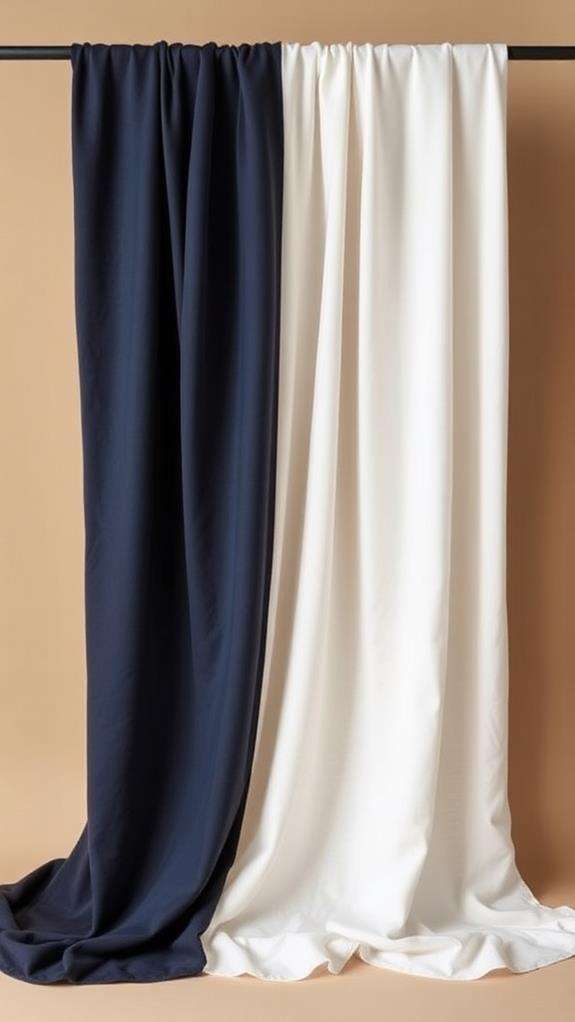
The fabric world's heavyweight contenders, modal and cotton, emerge from distinctly different origins. While you'll find cotton growing naturally in fields, with its fibers carefully harvested from around the seeds, modal takes a more industrial path, starting its journey as beech tree pulp.
When you're comparing these two materials, you'll notice their production processes couldn't be more different. Cotton requires extensive cultivation, involving traditional agricultural practices that have been refined over centuries in regions like Egypt, China, and the United States. Modal, however, represents modern innovation in sustainable fabric production, utilizing beech tree cellulose through a sophisticated semi-synthetic process that emphasizes environmental responsibility.
What's particularly remarkable is how these origins affect their environmental impact, especially regarding water consumption. You'll find that modal's production process is remarkably efficient, using 10-20 times less water than cotton production. While cotton naturally delivers breathable comfort and softness that you've likely experienced, modal's beech tree origins result in a silky smooth texture with excellent moisture-wicking properties. Both materials offer distinct advantages rooted in their unique origins, making them suitable for different preferences and needs.
Material Properties and Performance
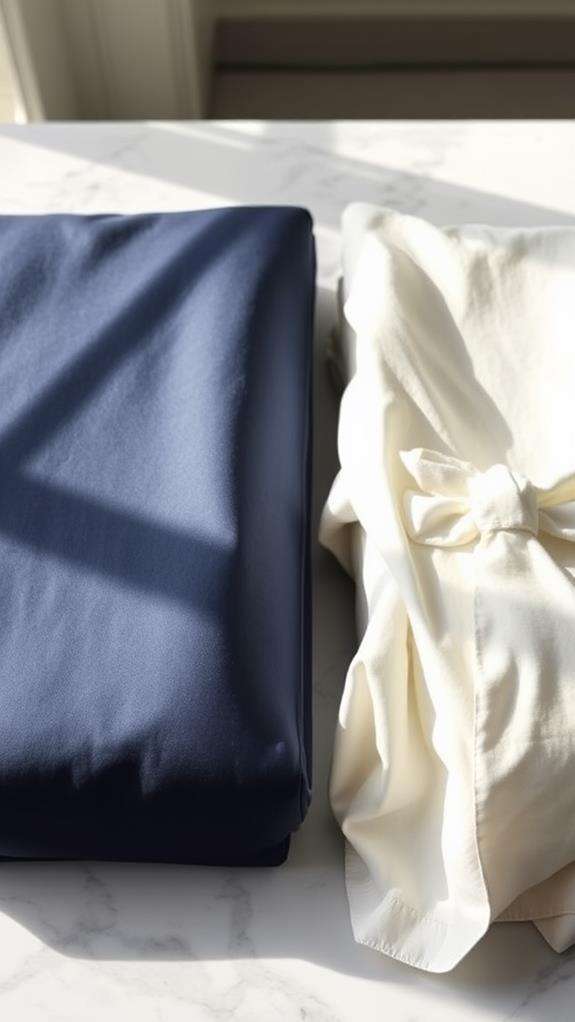
Both modal and cotton sheets showcase distinctive performance characteristics that directly impact your sleep experience. When you're comparing these natural fibers, you'll find that modal sheets excel with their superior moisture-wicking properties, absorbing 50% more moisture than their cotton counterparts to keep you dry throughout the night.
You'll notice significant differences in fabric properties between the two materials. Modal's exceptional softness and silky texture create a luxurious comfort experience that surpasses traditional cotton. While cotton sheets offer reliable breathability that you've likely come to expect, modal provides similar ventilation, though slightly less pronounced. If you're concerned about maintenance, you'll appreciate that modal sheets resist wrinkling and maintain their shape better after washing, unlike cotton which tends to wrinkle more easily.
When it comes to durability, your modal sheets will typically maintain their quality longer, though cotton sheets excel in providing warmth during cooler months. The trade-off between these materials often comes down to your specific needs – modal's moisture management and texture versus cotton's traditional breathability and warming properties.
Comfort and Sleep Experience
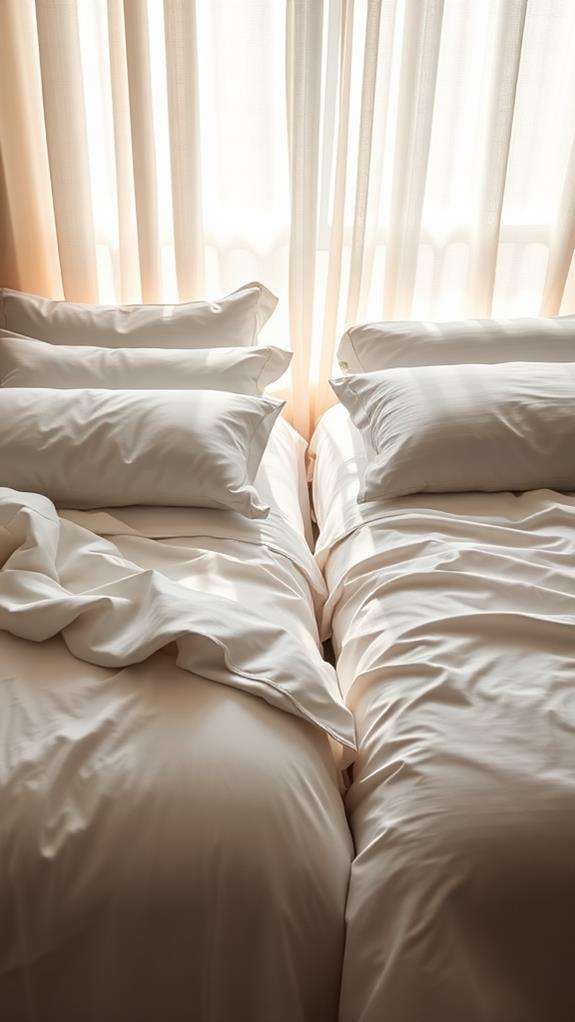
Every aspect of your sleep experience hinges on the comfort level your bedding provides. When you're choosing between modal and cotton sheets, you'll notice significant differences in how each fabric affects your night's rest. Modal sheets offer a soft fabric with a somewhat slippery texture that feels luxurious against your skin, creating an indulgent sleeping environment you'll look forward to each night.
You'll find that modal is more breathable than cotton, which becomes particularly important during warmer nights when temperature regulation matters most. If you tend to perspire while sleeping, modal's superior moisture absorption capacity – absorbing 50% more moisture than cotton – will keep you feeling dry and comfortable throughout the night. The fabric's anti-wrinkle properties also mean you'll spend less time on maintenance and more time enjoying your bed's polished appearance.
While cotton sheets provide their own comfort advantages, especially during colder months with their thicker composition, modal's combination of temperature regulation, moisture-wicking capabilities, and luxurious feel makes it an excellent choice for those prioritizing comfort in their bedding selection. You'll appreciate how these features work together to enhance your overall sleep quality.
Price and Value Comparison
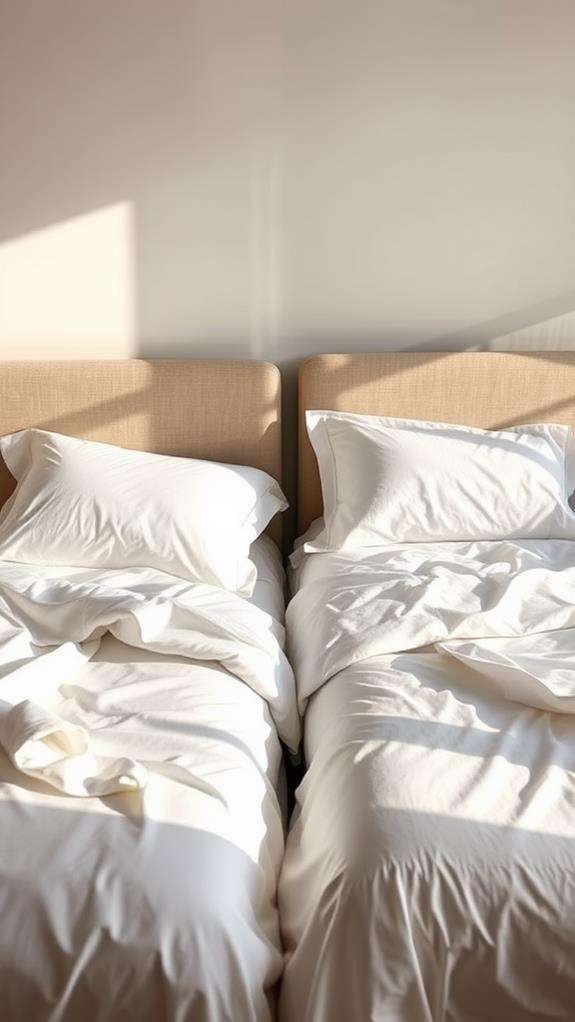
When comparing modal and cotton sheets, initial price tags reveal significant differences in investment levels. You'll find that modal sheets typically command a 20-30% premium over standard cotton options, reflecting their luxurious feel and specialized manufacturing process. Cotton sheets, particularly conventional varieties, offer more budget-friendly choices across various price points.
While you might experience sticker shock when shopping for modal sheets, it's important to evaluate their long-term value proposition. Their superior durability and resistance to shrinking mean you won't need to replace them as frequently as cotton sheets. The enhanced moisture-wicking and breathability properties of modal can justify the higher upfront cost if you're seeking ideal sleep comfort.
When exploring organic cotton options, you'll discover prices that often rival modal sheets, though there's more variation depending on thread count and brand reputation. If you're weighing your options, keep in mind that while cotton sheets provide reliable, cost-effective bedding solutions, modal's premium features might deliver better value over time. The choice ultimately depends on whether you prioritize immediate affordability or are willing to invest in long-lasting, premium sleep comfort.
Care and Maintenance Guidelines
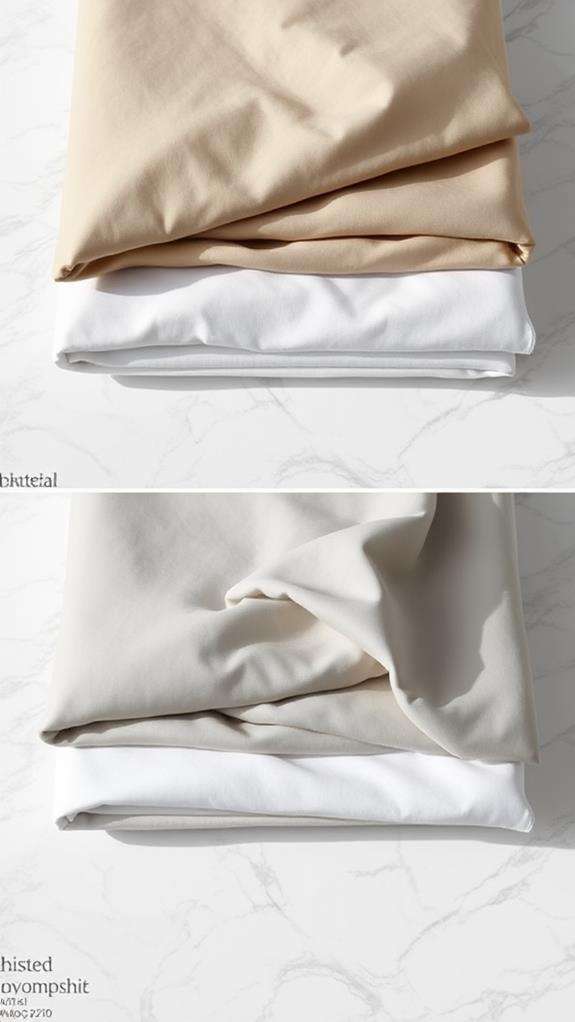
Proper care routines greatly impact the lifespan of your bedding investment. To maintain both modal and cotton sheets, you'll need to follow specific washing and maintenance guidelines that enhance durability while preserving fabric quality.
| Care Aspect | Modal Sheets | Cotton Sheets |
|---|---|---|
| Water Temperature | Cold water only | Cold to warm water |
| Drying Method | Low heat tumble dry | Medium heat acceptable |
| Softener Use | Optional, gentle type | Optional, gentle type |
| Wrinkle Control | Remove promptly, light ironing | Remove promptly, ironing as needed |
| Washing Frequency | Every 1-2 weeks | Every 1-2 weeks |
You'll want to avoid using bleach on either fabric type, as it can compromise the material's integrity and fade colors. When washing your sheets, use a gentle detergent to maintain freshness without damaging the fibers. For modal sheets, stick to cold water washing to preserve their softness, while cotton sheets offer more temperature flexibility. If you're dealing with wrinkles, you can iron both fabrics, though modal typically requires less pressing. Remember that while regular washing is essential for hygiene, over-washing can accelerate wear and tear, so maintain a balanced care schedule.
Frequently Asked Questions
Is Modal Better Than Cotton?
You might be surprised, but there's no clear-cut winner between modal and cotton. While modal offers superior moisture-wicking (50% better than cotton) and wrinkle resistance, cotton's time-tested breathability remains unmatched. Your choice should depend on your specific needs: if you're a hot sleeper, modal's moisture absorption could be your best bet. But if you're seeking classic breathability and live in a cooler climate, cotton's still an excellent choice.
What Is the Downside of Modal Fabric?
When you're considering modal fabric, you'll need to weigh several downsides. It's prone to fading, especially with frequent washing and sun exposure. You'll notice it's less durable than cotton and may wear out faster under heavy use. The fabric can feel damp if it doesn't dry properly, and you'll need to be careful about wrinkles. While it's marketed as eco-friendly, it still undergoes chemical processing during production.
Is Modal Good for Bed Sheets?
Like a cloud for your bed, modal sheets are an excellent choice for your bedding needs. You'll love their exceptional softness and moisture-wicking properties that keep you dry throughout the night. They're particularly great if you're a hot sleeper or value eco-friendly products. You'll appreciate their durability, as they're less prone to shrinkage and wrinkles than cotton. Plus, they'll maintain their shape and softness even after multiple washes.
Is Modal Too Hot for Summer?
You'll find modal isn't too hot for summer, thanks to its excellent moisture-wicking properties. While it might feel slightly warmer than cotton for some sleepers, modal's ability to absorb 50% more moisture helps keep you cool and dry. Its breathable nature allows good air circulation, and the lightweight fabric sits comfortably against your skin. If you're concerned about temperature, you can pair modal sheets with a lightweight duvet for ideal summer comfort.





